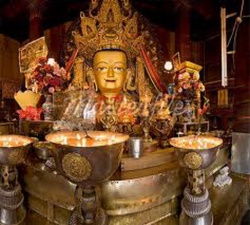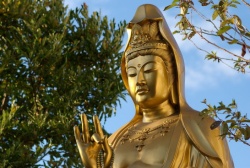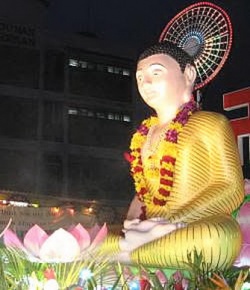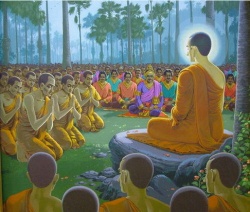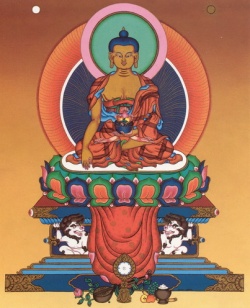Saṅghamittā
Formerly in the Moriyan lineage, a son called Bindusāra was born to the previous King called Candagutta 01 in the city of Pāṭaliputta, and after the death of his Father, while still growing, he became the King.
To that King there were two sons of the same mother, and to those two, there were ninety-nine other sons of the King who were brothers by different mothers.
To the eldest of them all, prince Asoka, the Lord of the Earth gave the vice-sovereignty over the country of Avanti.
Then one day the King came to the attendance hall and seeing his son, he sent him off saying: “Go to the country and dwell in the city of Ujjenī.”
In accordance with his Father's bidding, he went to Ujjenī by the interior road, and there in the city of Vedisa he arranged to make his dwelling in the house of the merchant Deva.
Seeing the merchant's daughter he reflected gladly and thought this: ‘I have heard she is endowed with auspicious marks, wealth, affection, and is amiable, if they will receive these gifts I will win her favour.’
They received what was given, and he became intimate with her. After life arose in the womb, she was led to the city of Ujjenī, and there she gave birth to the Prince's handsome son called Mahinda, and also had a daughter called Saṅghamittā.
When Bindusāra was lying on his deathbed he remembered his son, and sent ministers to fetch him from the city of Ujjenī. They went to Asoka with the news and announced his bidding, and he went quickly into their presence.
He placed his children and wife there on the interior road of the city of Vedisa, and went into his Father's presence. When his Father died in the city of Pāṭaliputta he did the proper duties to the body for seven days. Then he had his ninety-nine brothers by different mothers murdered, and raised the Royal canopy over himself, and was consecrated right there in the city.
After the two children were sent out of the presence of the King, the venerable mother herself resided right there in the city of Vedisa.
The Going-Forth of Saṅghamittā's Uncle and Husband
One day Prince Tissa went hunting and saw deer sporting in the wilderness, and having seen that he thought thus: “Even the deer who live on grass enjoy themselves in the wilderness, will not the monks who live on pleasant food also enjoy themselves?”
He went to his house and informed the King about his thought. To teach him, Asoka gave him sovereignty for seven days, saying: “You can experience sovereignty for seven days, young man, after that I will kill you.” 01
With the passing of seven days, he asked: “Why are you so wasted away?” “Through fear of death,” he said, and the King spoke again, saying: “Thinking that after seven days you will die you did not enjoy them, how will the strivers enjoy themselves, Dear, when they always contemplate death?”
Spoken to thus by his brother he gained faith in the Dispensation, and in time having gone hunting again, he saw the restrained Elder Mahādhammarakkhita, pollutant-free, being fanned with a Sāl branch by a Nāga, and the one with wisdom reflected: ‘When will I go forth in the Victor's Dispensation and live in the wilderness like this Elder?’
The Elder, in order to instil faith, rose into the sky, went to Asoka's monastery and stood on the water of the pool. He hung the robes he wore in the sky and descended into the pond 02 and bathed his limbs.
The Prince, having seen this psychic power, gained great faith, and saying: “Today itself I will go forth!” the wise one made a wise decision. He approached and respectfully asked permission from the King for his going-forth, and being unable to prevent him, the Lord of the World surrounded by a great retinue, took him to his own monastery, and he went forth in the presence of the Elder Mahādhammarakkhita. With him roughly four thousand other men also received the going-forth, but the exact number is not known. 03
The Lord of Men's nephew called Aggibrahmā, 04 well-known as the husband of the King's daughter Saṅghamittā, and their son who was known by the name of Sumana, after asking permission from the King went forth with the Prince.
The Prince's going-forth was in King Asoka's fourth year and increased the benefit of the multitude. Right there he received the higher ordination, and having the supporting conditions, while striving the Prince became a Worthy One, with the six psychic powers.
The Going-Forth of Mahinda and Saṅghamittā
On that day the Great King, decked out with all adornments, together with his harem and ministers, and surrounded by his army, went to his own monastery, 01 as though splitting the whole earth, 02 and, after worshipping the supreme Community, stood in the midst of the Community.
In that assembly there were eight hundred million monks, and of them one hundred thousand were strivers who had destroyed the pollutants. 03 There were also ninety thousand nuns in that place, and at that time one thousand nuns had destroyed the pollutants. Those who had destroyed the pollutants performed the miracle called ‘Opening the World’ 04 for the purpose of instilling confidence in King Dhammāsoka.
Previously, because of his wicked deeds, he was known as ‘Violent Asoka’ and later because of his meritorious deeds he was known as ‘Righteous Asoka’.
He looked at the Rose-Apple Island, which is surrounded on all sides by the ocean, and all the monasteries decorated with many offerings, and having seen that he was very satisfied, and after sitting down, he asked the Community: “Was anyone, venerable Sirs, so generous in the Dispensation of the Greatly Fortunate One?”
The Elder Moggaliputta 05 answered the King's question: “Even while the Fortunate One was living there has been no generosity like unto yours!” 06
Hearing that statement the King was very satisfied and asked him: “Is there anyone who inherits the Awakened One's Dispensation who is like unto me?”
The Elder saw the supporting conditions of the King's son Mahinda, and similarly of the King's daughter Saṅghamittā, and seeing the conditions for the growth of the Dispensation, being responsible for the Dispensation, he answered the King:
“Even such a one, who is greatly generous, is not known as an heir in the Dispensation. Whoever, Great King, having amassed a heap of wealth from the plains of the earth up to the tip of the Brahma worlds and would give it all as a great donation to the Community of monks is still only known as a supporter of material requisites, O Ruler of Men.
But he who lets his son or daughter go forth in the Dispensation is a true supporter of the Dispensation, as well as our material supporter.
Then the Lord of the World, wishing to have the nature of a supporter of the Dispensation, asked Mahinda and Saṅghamittā as they were standing there: “Will you go forth, Dears? Going-forth is known as a great thing.”
Hearing their Father's statement, they said this to their Father: “Today we will go forth if the God-King wishes, there will be gain for us and for you in our going-forth.”
Since the time of the Prince Tissa's going-forth the young man Mahinda had naturally desired to go forth; and Saṅghamittā had made a resolve at her husband Aggibrahmā's going-forth.
Although the Lord of the Earth desired to give the vice-sovereignty to Mahinda, even more that that he was pleased with his going-forth. His dear son Mahinda, who was wise, handsome and very strong, he let go forth with festivities, and also his daughter Saṅghamittā.
Then Mahinda, the King's joy, was twenty years old, and the King's daughter, Saṅghamittā, had reached eighteen. 07 On the same day he had the going-forth and higher ordination, and on that very day she had the going-forth and the placing in training. 08
The prince's preceptor was called Moggali, 09 the Elder Mahādeva let him go forth, but Majjhantika 10 made the formal announcement, and in the place of the higher ordination, 11 Mahinda attained Worthiness, together with the analytic knowledges. 12
Saṅghamittā's preceptor was the well-known nun Dhammapālā, her teacher Āyupālā, and in time she also became pollutant-free. They both were Lights of the Dispensation, and helpers of the Island of Laṅkā, they went forth six years after King Dhammāsoka came to the throne.
The Great Mahinda, who brought faith to the Island, in his third year learned the three baskets 13 in the presence of his preceptor. The nun, a crescent moon, the monk Mahinda, the sun, younger sister and brother, these two were Lights of the Awakened One's Dispensation.
